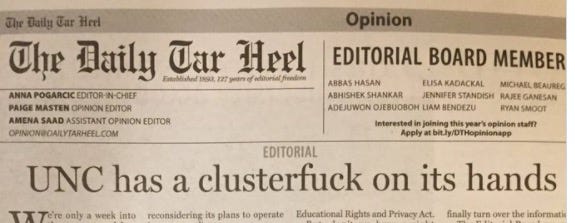The 6 Biggest Moments from Day 1 of the Democratic Convention
The zombie convention came to life.
Even for an age saturated in video, this new thing took some getting used to: a convention without an audience or applause. For the first hour the absence of rowdiness felt disconcerting, as viewers adapted to the flatness, the pace and jumble, and social media snarked "what am I watching here?"
Some of it was awkward. Some of it was cringey. But some of it was quite good, and by the end of the night it was clear that we aren't going to back to the old carnivals of buncombe celebrated by H. L. Mencken.
Welcome to the Daily Countdown. We have 77 days to go until the election; and then 78 days after that until Inauguration Day.
For a while, the Democrats' virtual not-really-a-convention felt like a telethon for a worthy and earnest cause: flags, cops, normal people, montages, and calls for decency. Less than 30 minutes in, it had already become a cliche to compare the speeches to the typical responses to a State of the Union, rather than the kind of spectacle we are used to hearing at a political convention.
But it was probably a very bad idea for the folks who thought they could follow it on Twitter, because this wasn't a convention designed for Twitter. At times, it felt like it was meant for... I don't know... who was this meant for? I was going to write "normal people," but were "normal people" really sitting around and watching much of this?
Political reporters seemed to struggle with the new regime. Julia Ioffe put some of this in perspective. "I think a lot of political journalists are feeling frustrated because this American schlock was always the bread and butter of political conventions," she wrote, "but we were too busy schmoozing and reporting to pay attention until the keynotes. Now we have to watch everything."
So what did we see? Six high points stuck out:
(1) "His only pre-existing condition was trusting Donald Trump—and for that he paid with his life.”
Kristin Urquiza, whose father died this summer in Arizona, opened her brief but impassioned speech bluntly: “I’m one of the many who have lost a loved one to COVID,” she said. “My dad, Mark Anthony Urquiza, should be here today, but he isn’t.”
The reason, she asserted, was President Trump.
“My dad was a healthy 65-year-old,” she said. “His only pre-existing condition was trusting Donald Trump—and for that he paid with his life.”
(2) Bruce Springsteen's "The Rising." The 3:31 minute montage captured rather dramatically the theme of much of the night.
(3) The Biden-Amtrak video. Some of my colleagues thought it was condescending, but I liked it. Nice human touch.
(4) John Kasich and the GOP orphans.
I'm not a fan, but the normally frenetic Kasich came off well. “I’m sure there are Republicans and independents who couldn’t imagine crossing over to support a Democrat,” Kasich said. “They fear Joe may turn sharp left and leave them behind. I don’t believe that. Because I know the measure of the man—reasonable, faithful, respectful. And you know, no one pushes Joe around.” I'm biased, of course, but it was great seeing Christie Todd and Meg Whitman, Susan Molinari, and the other refugees from RVAT.
(5) Bernie. Yes, Michelle was the star of the night, but Bernie provided crucial cover to Biden, and underlined one of the genuinely extraordinary things about last night: the almost preternatural, and quite unwonted, unity of the Democrats.
(6) Michelle Obama. Even the commentators at Fox News were impressed. For most of the night, I found myself missing the traditional convention speeches, but after watching the former First Lady, it was clear that our political culture has moved on.
Her speech was not just good. It felt like a decisive shift in the long and ragged tradition of political oratory. It was powerful and eloquent in a personal and direct way that set the bar for the speeches to come. This was Michelle Obama on empathy:
"Whenever we look to this White House for some leadership or consolation or any semblance of steadiness," she said, "what we get instead is chaos, division, and a total and utter lack of empathy."
Empathy: that's something I've been thinking a lot about lately. The ability to walk in someone else's shoes; the recognition that someone else's experience has value, too. Most of us practice this without a second thought. If we see someone suffering or struggling, we don't stand in judgment. We reach out because, "There, but for the grace of God, go I." It is not a hard concept to grasp. It's what we teach our children.
And like so many of you, Barack and I have tried our best to instill in our girls a strong moral foundation to carry forward the values that our parents and grandparents poured into us. But right now, kids in this country are seeing what happens when we stop requiring empathy of one another. They're looking around wondering if we've been lying to them this whole time about who we are and what we truly value.
They see people shouting in grocery stores, unwilling to wear a mask to keep us all safe. They see people calling the police on folks minding their own business just because of the color of their skin. They see an entitlement that says only certain people belong here, that greed is good, and winning is everything because as long as you come out on top, it doesn't matter what happens to everyone else. And they see what happens when that lack of empathy is ginned up into outright disdain.
They see our leaders labeling fellow citizens enemies of the state while emboldening torch-bearing white supremacists. They watch in horror as children are torn from their families and thrown into cages, and pepper spray and rubber bullets are used on peaceful protestors for a photo-op.
Sadly, this is the America that is on display for the next generation. A nation that's underperforming not simply on matters of policy but on matters of character. And that's not just disappointing; it's downright infuriating, because I know the goodness and the grace that is out there in households and neighborhoods all across this nation. Given the pace of our political cycles, we may have forgotten about last night by Thursday, But this one felt memorable.
Of course, Trump couldn't resist rising to the bait:
The contrast with next week's GOP convention will be striking.
On Monday, the RNC announced that the St. Louis couple who brandished guns at protesters will be featured.
Meanwhile, in Oshkosh . . .
“And we moved the capital of Israel to Jerusalem,” Trump said at a rally held at an airport in Oshkosh, Wisconsin, apparently referring to his decision to move the U.S. embassy from Tel Aviv. “That’s for the evangelicals.”
“You know it's amazing that the evangelicals are more excited about that than Jewish people. it's really right."
Several things: (1) Trump moved the embassy, not the capital; (2) Even in the era of Trump it's unusual for a president to admit openly that he made a foreign policy decision to curry favor with a voting bloc.
Remind me: are we supposed to take Trump seriously, but not literally? Or literally, but not seriously? Asking for the Jews.
Monday was a big day for Republican Voters Against Trump.
Mid-day, they released this powerful video from the Department of Homeland Security's former chief of staff, Miles Taylor:
Taylor also penned a piece in the Wapo about his experience seeing Trump's presidency up close. The details are extraordinary:
Though he was often talked out of bad ideas at the last moment, the president would make obviously partisan requests of DHS, including when he told us to close the California-Mexico border during a March 28, 2019, Oval Office meeting—it would be better for him politically, he said, than closing long stretches of the Texas or Arizona border—or to “dump” illegal immigrants in Democratic-leaning sanctuary cities and states to overload their authorities, as he insisted on several times.
Meanwhile, on talk radio...
Rush Limbaugh promotes right-wing stories calling Kamala Harris a “mattress” and “ho"
Honestly, I can't get past this: At a time when he ought to be thinking seriously about his legacy, Limbaugh has decided to go out ugly.
The number of COVID-19 deaths has topped 170,000 and the reopening of schools does not seem to be going well. The University North Carolina - Chapel Hill abruptly shifted back to remote learning after the virus spread quickly on campus. Historians will remember the incident at least in part because of the coverage in the student paper:

Mark this one down: On Monday, August 17, 2020 Trump declared: "The only way we’re going to lose this election is if the election is rigged.”
Historian Joanne Freeman touched on something a lot of us are feeling these days: "Like so many others, I’m staggered by daily bursts of upset and unknowingness, alternately depressed, anxious, angry, and distracted. There’s a whole-soul exhaustion born of living in the age of Trump."
There are 77 days to go.




